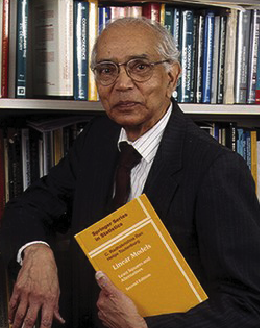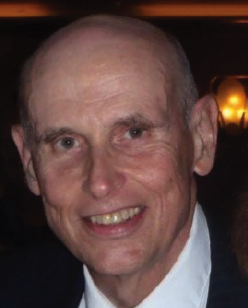Obituaries for October 2023
Greg Campbell
Estelle Russek-Cohen, ERCStat, and Lilly Yue, FDA/CDRH
Greg Campbell had nearly 33 years of federal government service, 13 years at the National Institutes of Health and 20 at the Food and Drug Administration, by the time he retired in 2015. He joined the NIH in 1982 after a faculty position in Purdue University’s statistics department, became a tenured research scientist at NIH, and was a member of the Laboratory of Mathematical and Statistical Methodology at the Division of Computer Research and Technology when Jim Mosimann served as chief. Mosimann remarked, “Greg was the most complete statistician I worked with, an understanding consultant with medical researchers from all institutes and a skilled mathematical statistician on the frontier of Bayesian analysis.”
Greg then became chief of the analytical biometrics section in the National Institute of Neurological Disorders and Stroke. In 1995, he joined the FDA as director of the Division of Biostatistics at the Center for Devices and Radiological Health. During his tenure there (1995–2015), Greg played a leading role in the development of the division and built a strong organization recognized for excellence. When he came in, there were only 18 statistical reviewers; when he left, there were 62 in five branches. He hired 80 mathematical statisticians and shaped the careers of many by hiring, mentoring, and leading with his vision, insight, and intelligence. Greg and his staff made numerous contributions to the statistical field, often motivated by the problems seen at the FDA. Several staff went on to leadership positions in other parts of the FDA.
Beyond the division, Greg played an outstanding leadership role in establishing a statistical community of medical devices. He was a founder of the annual FDA/AdvaMed Statistical Workshop, established in 2008, which is a forum for collaboration among industry, academia, and the FDA. He was also a driving force in the formation of the ASA Special Interest Group for Medical Devices and Diagnostics, which became a section in 2014.
In the broader community, Greg served as the president of the FDA Statistical Association in 1999 and the co-chair of the FDA/Industry Statistical Workshop in 2000. He also served as a member and then head of the Eastern North American Region’s advisory board in the early 2000s and had been on the board of directors for the Society for Clinical Trials.
To support medical device technology innovation and regulatory decision-making, Greg led many initiatives. He was a driving force and an exceptional leader in statistical innovation in the medical device world and in advancing regulatory science, and he helped shape the course of medical device evaluation. He pioneered, adapted, and advanced Bayesian statistical methodology, causal inference, adaptive design, missing data, and diagnostic test methodology, just name a few, in regulatory settings. His pioneering work and sustained leading efforts have made a profound, far-reaching, and long-lasting impact on public health, industry, and the FDA.
He also spearheaded the efforts in FDA statistical guidance development for medical devices, including guidance documents on implementing Bayesian statistics, pivotal clinical trial study design, and adaptive designs in regulatory submissions.
Greg was an internationally renowned statistical leader in regulatory science, highly respected by statisticians and other professionals within and outside the FDA. He was a member of the prestigious Senior Biomedical Research Service in the Department of Health and Human Services and a fellow of the ASA and Society of Clinical Trials. He received numerous awards, including the FDA Distinguished Career Service Award, FDA Commendable Service Award, FDA Merit and Outstanding Service Award, and FDA Scientific Achievement Award for Excellence in Analytical Science.
After Greg retired in 2015, he did not stop contributing to medical device statistics. He consulted and gave invited talks. His most recent publications include two in 2023, one of them on a topic he was passionate about: using Bayesian methods in regulatory submissions.
Greg was well known for his humor, kindness, gentleness, courage, and love of others. He treated people with genuine care, respect, and fairness. He leaves behind a loving wife, two children, and five grandchildren. Many of us lost a friend, but the statistical community lost a leader. He will be missed!
Calyampudi Radhakrishna Rao
 Renowned Indian-American mathematician, statistician, and professor Calyampudi Radhakrishna Rao passed away at the age of 102 on August 22, 2023.
Renowned Indian-American mathematician, statistician, and professor Calyampudi Radhakrishna Rao passed away at the age of 102 on August 22, 2023.
Rao was born September 10, 1920, in Hadagali, Karnataka, India. He grew up with six brothers and four sisters in a comfortable family environment created by his mother, A. Laxmikanthamma, and father, C.D. Naidu.
Rao earned his master’s in mathematics at Andhra University, another master’s in statistics at Calcutta University, and his PhD and ScD at Cambridge University. He also received 27 honorary doctoral degrees from colleges and universities, including seven from India and four from the United States.
Rao joined the ASA in 1970 and was honored two years later with election to fellow for outstanding and prolific contributions and his devotion to statistical teaching and service. The ASA Pittsburgh Chapter named Rao its statistician of the year in 1981. In 1989, he was awarded the Samuel S. Wilks Medal for outstanding contributions to statistics. In 1997, he received the Distinguished Achievement Medal from the ASA Section on Statistics and the Environment for outstanding contributions to the development of methods, issues, concepts, and applications of environmental statistics.
In addition to his extensive ASA activities and awards, Rao was a member of eight national academies in India, the United Kingdom, the United States, and Italy. He was elected a fellow or honorary member of 26 statistical, mathematical, and scientific organizations. Rao also received dozens of medals, citations, awards, and other honors for his contributions to statistics and science, including the highest statistics honor, the International Prize in Statistics, in 2023.
Statisticians and scientists throughout the world have celebrated Rao’s long career in statistics. In his remarkable 1945 paper published in the Bulletin of the Calcutta Mathematical Society, Rao demonstrated the following three fundamental results that paved the way for the modern field of statistics and provided statistical tools heavily used in science today:
- The first, now known as the Cramér-Rao lower bound, provides a means for knowing when a method for estimating a quantity is as good as any method can be.
- The second result, named the Rao-Blackwell Theorem, provides a means for transforming an estimate into a better—in fact, an optimal—estimate.
- The third result provided insights that pioneered a new interdisciplinary field that has flourished as “information geometry”.
Combined, these results form a foundation on which much of statistics is built and help scientists more efficiently extract information from data.
A tribute to Rao’s extraordinary contributions to statistics will appear in the December issue of Significance.
For more information about Rao from the ASA archives, read the following articles:
- “Interview with Professor Calyampudi Radhakrishna Rao”
- “C.R. Rao Receives National Medal of Science”
- “C.R. Rao’s Foundational Contributions to Statistics: In Celebration of His Centennial Year”
Bob Small
Anna Small
Bob Small died on June 3, 2023, after living life to the fullest and doing what he loved.
He was known for his love of and commitment to his family, his desire to play a significant role in his grandchildren’s lives, his lengthy bike rides all over the world, his habit of starting every day with a cup of coffee and at least one newspaper, his ability to do advanced math equations on paper napkins, his love of the Baltimore Colts, his dry sense of humor, his ornithological knowledge, and his ability to talk about anything—baseball, how the moon affects the tides, politics, history, or the many places he traveled. He enjoyed all the Star Wars movies with his children and grandchildren and was always willing to share a glass of wine or bowl of ice cream with friends or family.
Bob was the first in his family to go to college and attended the University of Maryland, College Park, where he met Gay. He earned a master’s degree from New Mexico State University and a PhD in biostatistics from North Carolina State University.
Bob was a fellow of the American Statistical Association and accomplished much professionally, giving him an interesting and rewarding career in the pharmaceutical industry. He made important contributions to vaccine development, especially global COVID-19 vaccines at CEPI. He refused to retire, and his work and cycling were his hobbies.
Bob was doing what he loved until the day he died. In January, he spent a week in Curaçao with his family and went scuba diving. In February, he hosted a dinner and wine party with friends and family from the Netherlands, New York, and Florida. In May, he celebrated his 79th birthday with his family and a few glasses of wine. He had recently returned from a business trip to London and was enjoying his consulting work. He was riding his bike when he collapsed.
While we had hoped to share more years with Bob, we take comfort in his full life and his not suffering at the end. We consider ourselves extremely fortunate to have had Bob as a husband, father, grandfather, and family member.



















Leave your response!